by Greg Smith, Scott Keeter, and John Green
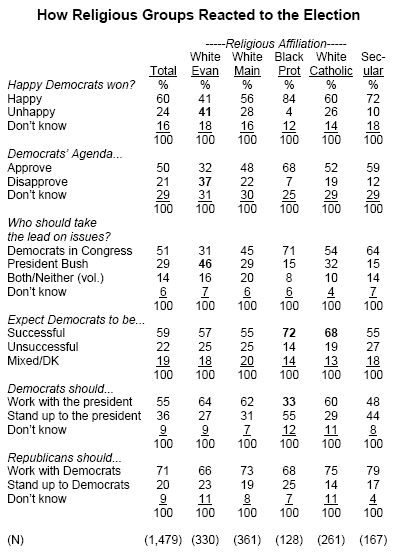
The religious divide in voting that has characterized American politics over the last several elections largely persisted in the 2006 election. But people in most religious groups say they are happy that the Democrats won, expect the party to be successful, and — with the exception of white evangelical Protestants — favor giving the party considerable latitude to pursue its agenda.
A post-election survey by the Pew Research Center for the People & the Press, conducted Nov. 9-12 among 1,479 Americans, found that all major religious communities want the Republican Party to try to work with Democratic leaders even if it means disappointing some of their supporters. At the same time, all religious groups except black Protestants say that Democratic leaders should try to work with President Bush to get things accomplished.
Election Reactions
Most Americans (60%) — including majorities of white mainline Protestants (56%), black Protestants (84%), white Catholics (60%) and seculars (72%) — say they are happy that the Democrats won the election. Only among white evangelicals did as many express unhappiness as happiness with the Democrats’ victory (41% each).
Similarly, by a 50%-21% margin, Americans say they approve of Democratic congressional leaders’ policies and plans for the future. Nearly half of white mainline Protestants (48%) and majorities of black Protestants, white Catholics and seculars express approval of the Democratic agenda. White evangelicals express less approval of the Democrats’ plans, but nearly as many evangelicals express approval (32%) as disapproval (37%). And majorities of all religious groups, including 57% of evangelicals, expect the Democrats to be successful in getting their programs passed into law.
Majorities of black Protestants, white Catholics and seculars, along with a plurality of white mainline Protestants, say that Democratic congressional leaders, rather than President Bush, should take the lead in solving the nation’s problems. Only among white evangelicals do those saying President Bush should take the lead (46%) outnumber those who favor seeing Democrats lead the way (31%).
But regardless of who they think should take the lead in Washington, majorities of all religious groups (including 66% of white evangelicals) say that Republicans should try as best they can to work with Democrats to accomplish things, rather than standing up to Democrats on the issues. Likewise majorities of white religious groups and a plurality of seculars say that Democrats should try their best to work with George W. Bush, rather than stand up to him on the issues. Only among black Protestants does a majority (55%) favor standing up to the president rather than cooperating.
Views of the Parties
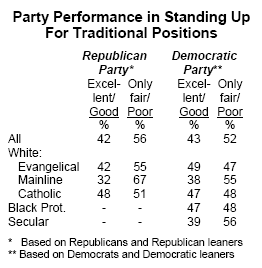
Pluralities or majorities of partisans within nearly all major religious groups rate their own party more negatively than positively. Among Republicans and Republican-leaning independents, 56% overall say the party is doing only a fair or poor job standing up for its traditional positions on things like reducing the size of government, cutting taxes, or promoting conservative social values; just 42% say the party is doing an excellent or good job. White evangelicals rated the party about the same as other Republicans — neither more positive nor more negative. White mainline Protestants, however, were considerably more negative about the GOP than other religious groups, with 67% rating the party’s performance as fair or poor.
On the Democratic side, the differences across religious groups were more modest. Black Protestants, a key part of the Democratic coalition, were divided in their views about the performance of the party: 47% said the party was doing an excellent or good job, 48% said it was doing only a fair or poor job.
Issue Priorities in 2006
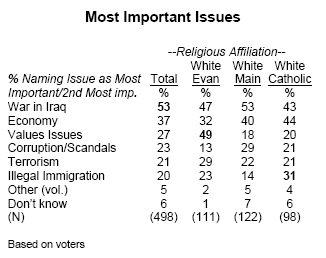
Most Americans saw the Iraq war as one of the top two issues in the election (53%), with the economy second (37%), followed by values issues such as abortion and marriage (27%). About one-fifth of the voters gave priority to corruption and scandal (23%), terrorism (21%), and illegal immigration (20%).
However, issue priorities differed across the major religious communities. White evangelical voters put values issues first (49%), slightly ahead of the Iraq war (47%), with the economy third (32%). Fewer than one-in-six mentioned corruption and scandals.
By contrast, white mainline Protestants fell close to the national average, with most naming the Iraq war (53%), followed by the economy (40%) and corruption (29%). White Catholics showed yet another pattern, with comparable numbers naming the economy and Iraq, followed by illegal immigration (31%).
Election Information in Church
Among Americans who reported attending religious services at least monthly, nearly three-in-ten (27%) say that information about political parties or candidates in the recent election was available at their place of worship in 2006. Among those who said they voted in the election, 22% reported that election information was made available at church — a higher proportion than in the presidential election of 2000 (14%) but not as high as in 1996 (28%).
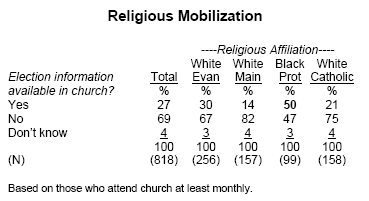
More black Protestants (50%) than other groups said that information about the elections was made available at their churches, though nearly one-third (30%) of white evangelicals reported this. Fewer white Catholics (21%) and mainline Protestants (14%) said they were exposed to political information through their churches.
Very few respondents said that they were encouraged to vote a particular way by clergy or other religious groups, however. Just 7% of churchgoing voters said they had been urged to vote for particular candidates or parties; 4% recalled being urged to vote Republican, 1% Democratic, and 2% could not remember for whom they were encouraged to vote. This was comparable to elections in 2000 and 1996.
A Look Ahead: The 2008 Presidential Nominations
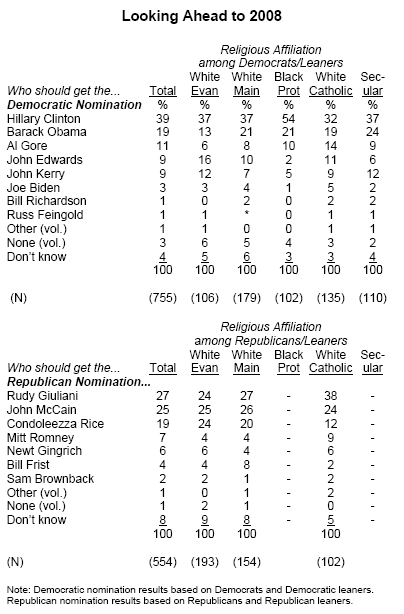
Relatively few religious differences are seen as yet in preferences for presidential nominations in the next election. Across all religious groups, Hillary Clinton receives at least plurality support among all Democrats and Democratic-leaners, including a majority among black Protestants (54%). Barack Obama is a distant second among Democrats and leaners with 19% support. Among black Protestants, Obama receives as much support as he does among other religious groups (21%) but still trails Clinton by 33 points. Indeed, Obama was second among all groups except white evangelicals, where John Edwards claimed the second spot with 16%.
Among Republicans and Republican-leaners, Rudy Giuliani and John McCain are tied for the top spot among white mainline and white evangelical Protestants. Secretary of State Condoleezza Rice receives a similar level of support among white evangelicals (24%). Giuliani leads McCain among white Catholics by 38%-24%.